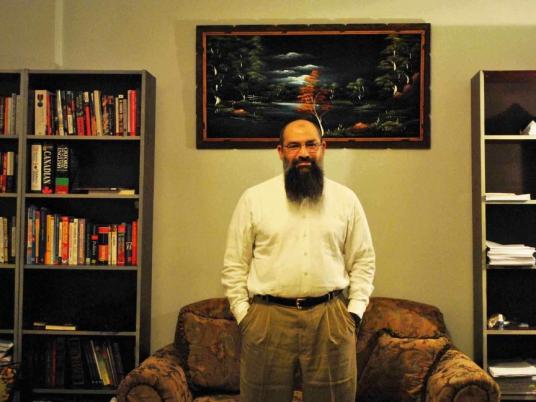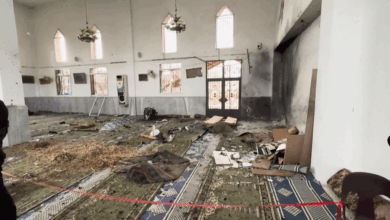
TORONTO — Mohammad Mahjoub first arrived in Canada in December 1995, fleeing political persecution in his native Egypt, where he was imprisoned and tortured by the Hosni Mubarak regime. He was granted refugee status in 1996.
Shortly after settling in Toronto, he met and married Mona al-Fouli, and had two children, Ibrahim and Youssef.
It was not very long, however, before his new life in Canada took a nightmare turn for the worse.
“I was on my way to work. I was about to cross the street when suddenly, I found several vehicles around me and many police officers saying, ‘Police! Police! Police!’” recounts Mahjoub. “I was looking right and left, and then found out I was the target. I was arrested right away without knowing why. It was like a Hollywood movie.”
On 26 June 2000, Mahjoub was arrested on a “security certificate,” a controversial legal mechanism housed under the Immigration and Refugee Protection Act, which the Canadian government has used to indefinitely detain five Muslim men without charge or trial on the basis of undisclosed, “secret” evidence. Together these men later became known as the “Secret Trial Five.”
Between Canada and Egypt
Mahjoub most likely first attracted the attention of the Canadian government after his name was mentioned in a wiretapped phone conversation between one of the later security certificate detainees, Mahmoud Jaballah, and another individual.
Shortly afterward, the Canadian Security Intelligence Service began to share information about Mahjoub with the Mubarak regime’s General Intelligence Service.
Apparently intent on extraditing Mahjoub back to Egypt, Mubarak’s security forces arrested and jailed three of his brothers in the summer of 1997. Between 1997 and 2005, they were arrested, released, and re-arrested no less than 25 times.
At the center of the Canadian government’s case against Mahjoub is the fact that he was listed as one of 107 people summarily convicted by an Egyptian military court in the 1999 “Returnees from Albania” trial, in which defendants were suspected by Egyptian intelligence of being national security threats or having ties to Islamic fundamentalist groups and many were kidnapped from abroad and secretly returned to Egypt.
Based on what is known to have been a forced confession provided by another defendant in the case, Mahjoub stood accused of being a key member of an Al-Qaeda-linked group in Egypt known as the Vanguards of Conquest.
Within a matter of hours, Mahjoub was sentenced, in absentia, to 15 years imprisonment in a trial that has been internationally condemned for failing to meet a minimum standard of due process.
After Mubarak was toppled in January 2011, the case was reopened, and many of Mahjoub’s co-accused have since been cleared of any wrongdoing and freed.
The West’s war on terror
Meanwhile, in Canada, Mahjoub had served seven and a half years in a Canadian maximum-security prison, nearly three of them in solitary confinement. As of today, he has never been charged with any crime.
“The conditions of my detention were very harsh — because of my background, my skin color, my religion, my beard and so on,” claims Mahjoub.
Nevertheless, he says it was not until the events of 9/11 — and the heightened climate of Islamophobia that followed — that his torment in detention truly began.
“After September 11, 2001, my whole life was turned upside down … I didn’t have anything to do with September 11 — I was in detention 15 months before then,” he affirms. “The day after September 11, they put me in solitary confinement, and took off all my clothes, except for a suicide-watch gown.”
“I was in a dark cell, without access to a toilet or light for 15 days. I was treated very badly by my jailers at Metro West Detention Center. … One of the staff even asked a detainee to harm me. He used very ugly language towards me. He said, ‘You are a fucking Muslim terrorist. People like you should be killed.’”
Mahjoub says he suffered physical abuse, repeated death threats and even attempted sexual assault by prison staff in the segregation unit.
Family pains
Yet, despite everything that has happened to him over the course of the past 12 years, it is only when he begins to talk about the impact of the case on his family that his composure becomes visibly shaken.
“Detention affects the family completely. … For instance, the kids grow up without their dad. They don’t know who their dad is, because when I was detained, my two sons were very little. One was two and a half, and the youngest one was only a few months old.”
In 2006, Mahjoub was transferred to a new, multimillion-dollar facility in Kingston, Ontario, built specifically for security certificate detainees and dubbed “Guantanamo North.”
A February 2007 landmark ruling from the Supreme Court of Canada deemed security certificates to be unconstitutional. Yet, less than a year later, the Conservative Party government of Prime Minister Stephen Harper managed to successfully introduce a slightly amended version of the same law.
Mahjoub and the other security certificate detainees were again back to square one.
Mahjoub was finally ordered released on house arrest later in 2007. However, it was far from a happy family reunion.
Strict bail conditions attached to his release placed a heavy burden on his wife and sons, who were required to physically monitor him at all times and were even themselves placed under constant government surveillance.
“My wife and stepson were playing the role of my jailer, and they were jailed with me as well. They couldn’t leave me by myself at all. They were detained with me 24/7,” he recounts.
“It is very difficult to explain how harsh, how terrible the conditions imposed on me and my family were. Let’s say I can handle it, as a man, I already spent years in detention — three of those years in segregation — but my wife and my little kids can’t. They are human, like anybody else. Why should these conditions be imposed on them?”
Rather than continue to subject his wife and sons to further humiliation and punishment, he requested to be returned back to detention at “Guantanamo North” in June 2009.
In November of that year, Mahjoub was again ordered transferred to house arrest — but by this time, his marriage was over. Unable to cope with the constant invasion into the family’s private space, his wife decided to leave him and take the children with her, he says. He has not been allowed to see his sons in over two years.
“My apartment window had a sensor. Whenever I wanted to smell fresh air, I had to call my jailer to open the window. If I wanted to close the window, I had to call my jailer again,” insists Mahjoub.
“I wasn’t even allowed to speak to people in the street. I still have a GPS band on my foot, 24/7. There was a two-way video camera inside my place, in addition to the security camera outside of my residence. My phone is tapped,” he says. “Detention, in my opinion, is much better than here. They kill you slowly, step by step. … It has many negative impacts on me mentally, physically and emotionally.”
Suspended justice
The Federal Court recently ruled that the presumption of innocence in security certificate cases does not apply, since no charges exist in the first place.
As a result, Mahjoub exists in a state of legal limbo: He faces either indefinite detention without charge or trial in Canada, or deportation back to Egypt, no matter what threat of torture or other human rights violations may await him there.
Yavar Hameed, one of Mahjoub’s lawyers, says defending his client under such exceptional circumstances has been anything but easy.
“Mr. Mahjoub has for 12 years remained with the most severe bail conditions in Canadian history. But because it’s colored by what the ministers call national security, it somehow justifies the greatest kinds of violations to his life, liberty, and security that we’ve ever seen,” Hameed says.
From the time of his arrest in 2000 until 2006, the Canadian Security Intelligence Service admitted to listening in on confidential phone calls between Mahjoub and his lawyers in a breach of the solicitor-client relationship. Canadian intelligence also systematically destroyed or concealed key evidence in the case, only further adding to the long list of factors that make any sort of fair hearing for Mahjoub virtually impossible.
In the summer of 2010, the Department of Justice illegally seized 14 boxes of confidential court documents belonging to Mahjoub and his defense team, which they then transferred to their own offices before proceeding to sort, analyze and copy the materials inside.
“If this is their behavior, what’s the difference between Mubarak’s regime and this regime here?” asks Mahjoub. “If their attitude is the same, there is no difference. Why do they call themselves a democratic society?”
In December 2012, Mahjoub experienced a major breakthrough in his case, when an Egyptian court overturned his previous conviction in the ‘Returnees from Albania’ trial. As a result, he no longer has any outstanding charges or convictions against him anywhere in the world.
On 7 January, the Federal Court lifted many of Mahjoub’s remaining bail conditions. He hopes that this year his security certificate case will finally be quashed, once and for all.
This piece was originally published in Egypt Independent's weekly print edition.




